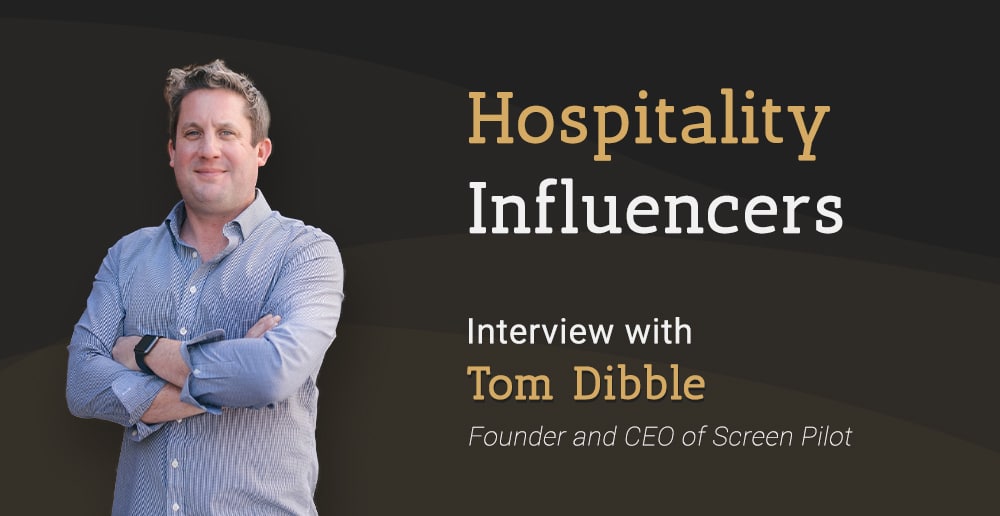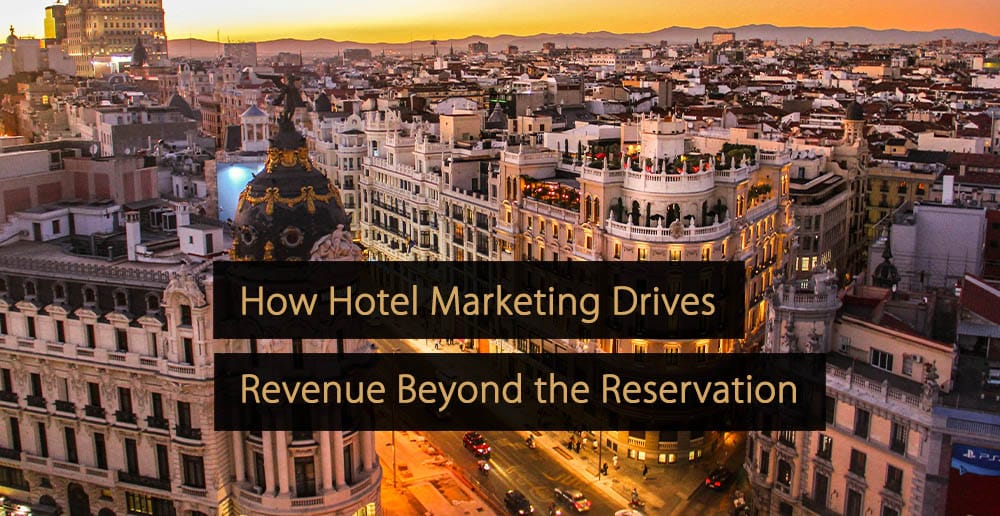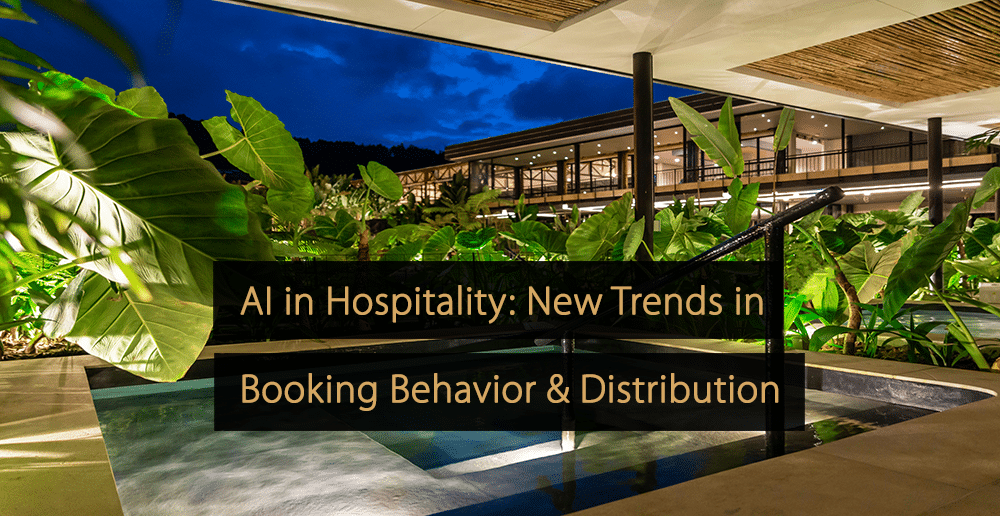In the series hospitality influencers, we provide insights into the future of hospitality through interviews with inspiring individuals actively shaping the industry. These thought leaders share their stories and provide industry perspectives, challenges, opportunities, and innovations. Join us in exploring the future of hospitality.
In this interview, we’re talking to Tom Dibble, the founder, and CEO of Screen Pilot. Screen Pilot optimizes hotels’ direct distribution channels with comprehensive digital marketing solutions. This provides several benefits, including increased booking and brand recognition, decreased need for third-party services, and a larger return on investment.

Can you tell us a bit about yourself?
I was born in the U.K. and spent a few years in Belgium before returning. From a young age, I showed an interest in travel and technology. I even recall programming a searchable travel brochure on a Commodore 64 when I was ten. My diverse upbringing exposed me to many different cultures and languages. Likewise, it fostered a deep appreciation for global perspectives.
I graduated from university with a degree in media production. Although I initially planned to pursue a career in media, I quickly discovered a passion for marketing during my studies.
This newfound interest led me to pivot my career path toward digital marketing. I took that new path just as the commercial internet was beginning to emerge. I then combined my creative skills with the strategic aspects of marketing. This unified approach sparked an affinity for digital media and marketing.
I’ve worked in multiple industries over the years, and this experience has helped me gain a broad understanding of diverse markets and consumer behaviors. However, I found my true calling in the travel and hospitality sector. In this role, I’m able to merge my passion for marketing with my love of travel. The journey led my wife and I to move to the U.S. about 20 years ago, where I started Screen Pilot.
What was your first job in the hospitality industry?
My work in the hospitality industry began in my early twenties when I managed bars at Center Parcs, a network of holiday villages in the U.K. The role immersed me in a vibrant setting. I enjoyed interacting with guests and managing a dynamic team within an exciting environment. The experience was instrumental in developing my managerial skills and deepening my appreciation for the fast-paced nature of the hospitality industry.
What triggered you to start your company?
The spark for starting Screen Pilot stemmed from a pivotal moment when, as a marketing consultant, I faced a critical decision. I could continue as a solo professional or expand to service an increasing demand. This crossroads wasn’t just about growth but a greater vision.
Through years of experience, I’d developed a set of methods and practices that consistently drove performance for my clients. The scalability and adaptability of these practices made them a solid foundation for a larger consultative operation.
It was an opportunity to expand, innovate, and redefine what advanced digital marketing strategies could look like in the hospitality industry. This was especially significant as hospitality often lagged behind others in marketing sophistication and digital innovation. The industry was ripe for transformation.
Screen Pilot set out to challenge the status quo by implementing forward-thinking strategies that were proven to elevate the entire guest experience. It integrated the latest digital trends to create a more dynamic and engaging customer journey.
What is the story behind your company?
I founded Screen Pilot out of a passion for leveraging technology to positively impact digital marketing performance in the hospitality industry. Our early days were a blend of research and development. At the same time, we were performing organic and paid search strategies at high-impact levels for our boutique and independent clients.
The more I learned about the space, the more I noticed a gap in the market. Hotels and resorts struggled to effectively market themselves in an evolving digital universe. With my background in consulting, I envisioned a company that could bridge this gap and provide comprehensive digital marketing solutions to elevate performance while bringing new technologies to the arena at the same time.
The hospitality industry has always been highly competitive, and in our early years, convincing hoteliers to invest in digital marketing required a lot of perseverance. We began with a small team and focused on delivering exceptional results for a few key clients. As we grew, we constantly adapted to the evolving digital landscape. We expanded our services to include social media marketing, SEO, content creation, and more.
Our commitment to staying ahead of marketing trends and our focus on delivering measurable results helped us grow our client base. Each step of our journey has been marked by learning and innovation. For example, we were early adopters of data and analytics to optimize our marketing campaigns. It’s a common practice now, but this set us apart from our competitors for many years.
It’s incredibly satisfying to see Screen Pilot now recognized as a leader in digital marketing for the hospitality industry. Our success is a testament to both our team’s skill and dedication and our client’s trust in our professional services and technologies.
What does your company solve?
We help hotels increase direct bookings. We excel at optimizing the direct distribution channel, effectively putting heads in beds, and significantly reducing the reliance on third parties. This approach enhances profitability and ROI while strengthening brand loyalty and guest recognition.
Our blend of proprietary art, science, and technology empowers hotel and resort teams to capture the full value of every guest interaction. This process transforms travel shoppers from passive viewers to engaged bookers and guests.
The strategic alignment with consumer demands is what sets us apart, making Screen Pilot a leader in driving growth and profitability for our clients and consistently delivering results far above industry benchmarks.
Based on your extensive experience in the industry, what are the fundamental marketing strategies that you believe every hotelier should consistently implement to ensure their hotel’s visibility and success?
Establish a robust digital presence. This includes creating a user-friendly, mobile-optimized website and maintaining an active social media presence to engage with guests.
Focus on Search Engine Optimization (SEO). Optimize website content and improve site speed to appear prominently in search results. And make sure you don’t neglect local SEO.
Deploy targeted Pay-Per-Click (PPC) advertising. Campaigns on platforms like Google Ads and social media are proven to drive traffic and direct bookings.
Manage your online reputation. Actively monitor and respond to guest reviews on platforms like TripAdvisor and Google to nurture a positive reputation.
Share content of value. Content is still king, especially in marketing. Sharing content of genuine interest and value to travelers via social channels, blog posts, websites, and video channels drives organic traffic and showcases a hotel’s community and unique features.
Keep in touch via email. Email marketing isn’t passé. The lists you’ve been building have a great deal of value. Personalize offers and send updates to enhance guest engagement and conversions.
Engage on social media. Post regularly and leverage user-generated content. Explore partnerships with influencers to boost visibility.
Personalize your marketing. Utilize data analytics to understand guest preferences and personalize marketing efforts across as many channels as possible.
Nurture strategic partnerships. Build relationships with local businesses and tourism boards to enhance visibility and create co-branded marketing campaigns. Implementing these strategies will significantly boost a hotel’s visibility and ensure long-term success.
Could you describe an innovative and successful marketing campaign your agency has developed for a hotel client?
Personalization is the future of marketing. It means using data to tailor messages to consumers’ preferences, wants, and needs. With our Digital Brand Experience (DBX) personalized marketing program, we consistently help hotels increase direct bookings anywhere from three times to six times their previous average.
Our proprietary DBX approach enables hotel teams to deliver relevant, personalized content through an omnichannel digital messaging and retargeting strategy. We leverage advanced data analysis, user experience, branded storytelling, and personalized journeys to maximize engagement and conversions.
This strategy ultimately maximizes conversions as well. And the targeting capabilities are incredible. Families, couples, locals, summer travelers, midweek travelers, whatever the team’s goal, DBX can serve that audience with a custom, personalized experience.
One of our earliest DBX clients was Carneros Resort and Spa, a luxury resort in Napa Valley. They implemented DBX and saw conversion rates quadruple for their family and couples audiences when compared to overall organic website traffic. La Cantera Resort & Spa in San Antonio, Texas, used DBX to target summer travelers and was able to triple its conversion rate.
Sanctuary Camelback Mountain, a resort and spa in Scottsdale, Arizona, used DBX to craft a personalized journey for the local market and increased bookings by in-state residents 5X. Willows Lodge, a wine country resort just outside of Seattle, used DBX to target midweek couples for a 7X increase in its conversion rate.
Not only are these properties seeing more direct bookings, but guests who receive a personalized journey consistently generate more revenue than those who don’t. And none of these hotels had to make a major technology pivot or change booking engines. DBX works with the tools hotel teams already use, so there are no tech barriers standing in the way of marketing personalization.
What are some of the biggest challenges hotels face today regarding marketing?
The rapid evolution of technologies and consumer behaviors demands continuous adaptation from hotel marketing teams. One of the most significant hurdles for these teams is underinvestment in direct distribution strategies.
Many hotels are excessively dependent on third-party booking platforms, which can erode brand loyalty and increase costs. Additionally, the availability of an enormous number of technological products complicates the selection of effective solutions that will seamlessly integrate with existing systems.
To overcome these challenges, hotels must focus on enhancing direct guest engagement, smartly invest in technology that improves customer experiences and operational efficiency, and remain adaptable to changing marketing dynamics.
How do you stay updated with the latest hotel marketing trends and advancements in the hospitality industry? And which trends are you most excited about?
I’m currently most excited about the potential of artificial intelligence (AI). AI’s ability to be leveraged not only within our own ecosystem but also throughout the entire hotel industry is transformative. AI will enable more personalized shopping experiences that seamlessly integrate with what’s seen in the real world.
AI will also optimize operations and aid decision-making processes, fundamentally reshaping how hotels connect with and serve their guests. Additionally, AI will integrate and analyze data from multiple systems and interactions, constructing a far more comprehensive and nuanced understanding of individual guests than ever before.
How will technology change the hospitality industry over the next five to ten years?
AI will be at the heart of hospitality’s evolution for the foreseeable future. This will range from how hotels operate to how they interact with guests to the personalized experiences they deliver. AI-powered chatbots and virtual assistants will become standard in customer service, handling inquiries and booking processes around the clock.
These AI systems will enhance the overall booking experience by providing instant responses and personalized recommendations based on guests’ preferences. For instance, guests searching for a family-friendly hotel will receive tailored suggestions that match their needs, making the process smoother and more efficient.
AI will significantly improve operational efficiency. AI-powered predictive maintenance will reduce downtime and costs by enabling hotels to anticipate and address maintenance issues before they become problems. AI-driven data analytics will ensure that hotels operate at peak efficiency while maintaining high service standards by optimizing staffing levels based on occupancy patterns and guest behaviors.
Moreover, AI will enhance the guest experience through personalization. Smart rooms equipped with AI technology will allow guests to control room settings. Some possibilities include lighting, temperature, and entertainment. All of that might be done via voice commands or mobile apps. These systems will learn guests’ preferences over time, creating a more comfortable and customized stay.
AI will also transform marketing and revenue management. Advanced algorithms will maximize revenue by analyzing vast amounts of data to predict demand and optimize pricing strategies in real-time. AI-driven personalized marketing campaigns will target guests with offers and promotions tailored to their preferences and past behaviors, increasing engagement and conversion rates.
And that’s just the tip of the iceberg. AI is still in its infancy. The longer the hospitality industry spends with the technology, the more innovative uses we’ll find for it.
More Tips to Grow Your Business
Revfine.com is the leading knowledge platform for the hospitality and travel industry. Professionals use our insights, strategies, and actionable tips to get inspired, optimize revenue, innovate processes, and improve customer experience.Explore expert advice on management, marketing, revenue management, operations, software, and technology in our dedicated Hotel, Hospitality, and Travel & Tourism categories.








Leave A Comment